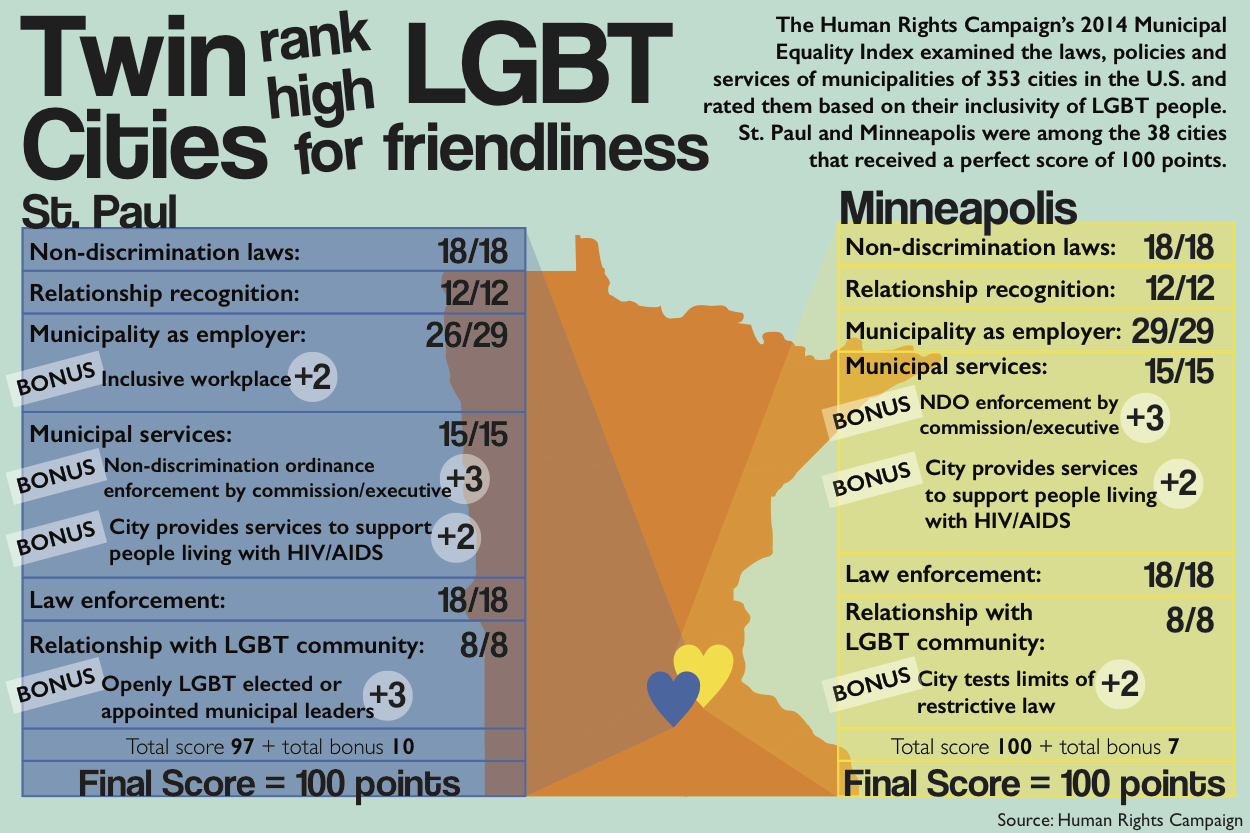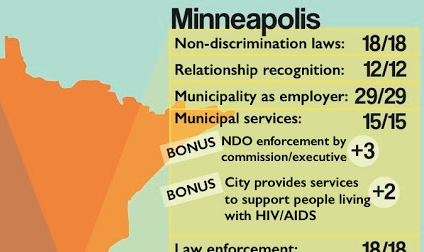
Both Minneapolis and St. Paul received perfect scores on the Human Rights Campaign’s 2014 Municipal Equality Index, a one-of-a-kind measurement tool that rated 353 cities across the country for LGBT inclusivity.
While the rankings don’t measure a city’s atmosphere or quality of life, they do evaluate laws and policies and examine how inclusive city services are of LGBT people. A warning on the report reads, “Some high-scoring cities may not feel truly welcoming for all LGBT people, and some low-scoring cities may feel more welcoming than their policies might reflect.”
Senior Lauren Schufman, president of the Queer-Straight Alliance at St. Thomas, said this may be true for the Twin Cities.
“I am so glad to hear that the Twin Cities are considered a safe space for LGTBQ+ people, but I can pretty much guarantee that there are people in the LGBTQ+ community who don’t feel that way about the Twin Cities – it’s all very personal and circumstantial,” Schufman said.
Cities were rated on a scale of 0-100 that took into account a city’s laws, policies, benefits and services. The scores were based on six factors: non-discrimination laws, relationship recognition, how employers treat LGBT workers, municipal services, fair law enforcement and leadership relationships with the LGBT community.
Schufman said the Twin Cities’ high score could be because Minnesota is a relatively liberal state.
“I think that there is definitely good energy surrounding the Twin Cities’ LGTBQ+ communities,” Schufman said. “We have very active groups like OutFront MN, and all across college and high school campuses, QSAs are popping up.”
Theology professor and QSA faculty adviser Cara Anthony said companies like Target and 3M, which have taken the lead on workplace equality, may also have been a contributing factor.
“Those business values, I think, are shared by those who run the civic government,” Anthony said.
Despite the Twin Cities being one of the most LGBT-friendly cities in the country, senior Elizabeth Miner said the local LGBTQ+ community puts too much merit in how attractive its members are.
“The problem with the queer community in the Twin Cities is that if you’re not attractive, then you don’t have a place,” Miner said. “So (the ranking is) true in that the straight allies who live here are about as accepting as they possibly could be in this country, but the community really still has some work to do.”
Junior Acadia Stephan said it’s exciting to have this rating, but she thinks people need to be aware there’s still a lot that needs to be done.
“Even though it’s exciting to hear that (and) it means there’s been progress, there’s always still things to work on,” Stephan said.
Schufman said while supporting gay and lesbian rights is a pretty common practice in the Twin Cities, even within religious groups, other identities are less supported.
“There is still a lot to be done for minority identities, and I think it’s important to remember that we have come very far, but we still need to keep working towards equality for all,” Schufman said. “Sometimes I think people forget that there is more to the queer community than just those who identify as gay and lesbian.”
One way St. Thomas is being inclusive, according to Anthony, is by recently extending health care benefits to all legally married spouses, regardless of gender.
“That sends a huge message about who is included and welcome in the university,” Anthony said.
Despite this, Schufman said students may feel afraid or uncomfortable going to QSA meetings or coming out.
“There are many subtle things that make people feel unsafe to come out at this school, like a professor who makes side comments against the LGTBQ+ community or the heteronormative society that develops in the dorms, or even the fear of losing a job,” Schufman said.
Schufman added that students can also change the way they use language, like asking what gender pronouns someone prefers.
“It’s much better to ask and then use the correct pronouns than to call someone who prefers ‘he, his, and him’ as ‘that girl’ or something,” Schufman said. “Also, something like, ‘Are you dating anyone right now?’ instead of, ‘Do you have a boyfriend?’ is a much better question to promote open conversation.”
Schufman said one way students can be more accepting and inclusive is to attend QSA meetings.
“Help us plan. Help us change. Help us make this community the best it can be. It’s really hard to enact change when there are so few active members,” she said.
Jamie Bernard can be reached at bern2479@stthomas.edu.




The comments that go along with this infographic show just how important it is to get the opinions, as well as, the facts. I think that St. Thomas should create a campaign, like they did with the Sexual Assault campaign to break down the heternormative culture on campus. The campaign could include the simple questions asking for pronouns or asking who they are dating. Breaking away from ASSUMPTION is key to dismantling the damaging heternormativity I see and hear everyday on campus.
heteronormative *